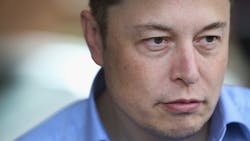Musk Fails to Assure Investors Rattled About SolarCity Takeover
Elon Musk defended his proposed marriage of Tesla Motors Inc. and SolarCity Corp. with a second conference call in about 14 hours to assure investors his $2.86 billion plan to combine the companies is a “no brainer” that would benefit both.
“From my standpoint this makes Tesla’s future execution easier, not harder,” said Musk Wednesday. “It’s increasingly unwieldy to work with Solar City at an arm’s length basis.”
But Tesla investors haven’t embraced the news. The shares opened on Wednesday down 9.8% to $198.13 at 9:31 a.m. New York time after falling as much as 14% in extended trading Tuesday. In a sign of skepticism for the deal, SolarCity shares rose 7.5% to $22.77 at 9:55 a.m., well below the range of $26.50 to $28.50 Musk said Tesla would likely pay.
Analysts raised concerns about management focus, the solar company’s debt and corporate governance issues between the two businesses that share the same chairman and largest shareholder -- Musk, who is also chief executive officer of the electric-car company.
Oppenheimer & Co. analysts including Colin Rusch downgraded Tesla to perform from outperform in a research note published late Tuesday, saying they expect “a robust shareholder fight over this acquisition centered on corporate governance.”
“We believe investors are likely to view this transaction as a bailout for SCTY and a distraction to Tesla’s own production hurdles,” Rusch said in the note.
While it’s unusual to announce a proposed acquisition rather than a definitive agreement, Musk’s holdings in the two companies required him to keep the market informed, which benefits other shareholders, Todd Maron, Tesla’s general counsel, said on Wednesday’s call.
“The result of this is that this is actually a more transparent process because you’re essentially seeing behind the curtains more than you would ordinarily see in a transaction,” he said.
Credit Suisse Group AG analysts including Patrick Jobin said in a separate note that they expect “resistance from Tesla shareholders” and warned of “many corporate governance challenges.”
“Investors expect Tesla to keep all its focus on completing the gigafactory and on quickly ramping up production of Model 3 in 2018,” said Salim Morsy, an analyst with Bloomberg New Energy Finance. “Both of these goals are existential for Tesla. A SolarCity acquisition doesn’t help execute these critical milestones.”
But the billionaire was upbeat on Tuesday’s conference call. “In my personal opinion, this is obviously something that should happen,” Musk said.
Tesla announced its bid for SolarCity in a blog post, saying the acquisition would “complete the picture.” The move comes as Tesla finishes construction of its battery-manufacturing gigafactory east of Reno, Nevada, and prepares to begin output of the Model 3, its more affordable electric car, late next year. Musk has said he wants to build 500,000 cars a year by 2018, two years sooner than originally planned.
If the deal is approved, SolarCity would become a unit of Tesla. It’s already part of the family: SolarCity CEO Lyndon Rive and co-founder and Chief Technology Officer Peter Rive are Musk’s first cousins. The three of them hatched the idea for SolarCity during a trip to the Burning Man arts festival in the Nevada desert more than a decade ago.
Related: In SolarCity Bid, Tesla’s Musk Targets Customer Who Wants It All
According to Tesla, the all-stock deal is worth $26.50 to $28.50 for each SolarCity share. That calculates to a premium of as much as 35% from Tuesday’s closing price. The average 12-month price target among analysts surveyed by Bloomberg is $29.82. SolarCity rose 16% to $24.61 and Tesla sank 10% to $196.85 at 6:20 a.m. New York time.
'Room for a Deal'
“It’s clearly not a ‘done deal,’ but rather just an offer for now,” said Pavel Molchanov, an analyst at Raymond James. “I think there is room for a deal, but likely at a higher level, maybe in the $30s.”
With 100.2 million SolarCity shares outstanding, the proposal is worth as much as $2.86 billion. Including net debt, the deal values the company at about $5.7 billion, according to data compiled by Bloomberg.
Tesla is being much more generous than other acquirers in the industry have been. The bid values SolarCity at about 12.6 times revenue, according to data compiled by Bloomberg, while buyers over the past five years have agreed to pay an average of 5.7 times sales for alternative-energy companies. The data looked at deals valued at $100 million or more in areas such as solar, wind and waterpower.
Musk said he and Antonio Gracias -- a member of both boards -- would recuse themselves from voting on the takeover offer. JB Straubel, Tesla’s CTO, is also a SolarCity director.
Tesla shareholders will likely look askance at taking on more debt by combining the money-losing companies, said Morsy, the BNEF analyst.
“The company just raised $1.4 billion from an equity issuance in May to finance an accelerated production ramp of Model 3,” he said in an e-mail. “Investors will have trouble looking past the $3.2 billion in debt that Tesla moves on to its own balance sheet for a SolarCity enterprise value of just $5.8 billion.”
Musk owns 22% of SolarCity and 21% of Tesla, the youngest and smallest publicly held U.S. automaker. The two companies work closely together: SolarCity picked batteries made by Tesla to provide 13 megawatts of electric storage for an array of solar panels to be built on the Hawaiian island of Kauai.
“Tesla customers can drive clean cars and they can use our battery packs to help consume energy more efficiently, but they still need access to the most sustainable energy source that’s available: the sun,” Musk said in the blog post.
“Most of our customers have an interest in solar,” he said on the conference call. “But a small%age actually have it.”
About the Author
Bloomberg
Licensed content from Bloomberg, copyright 2016.
